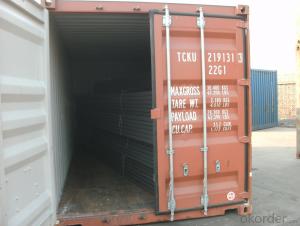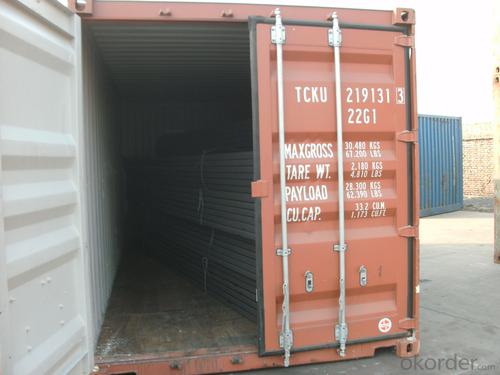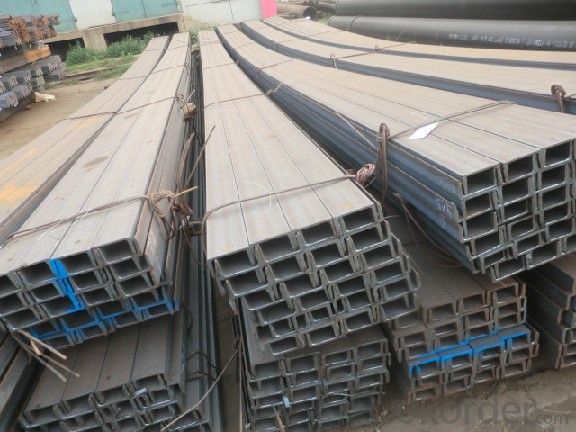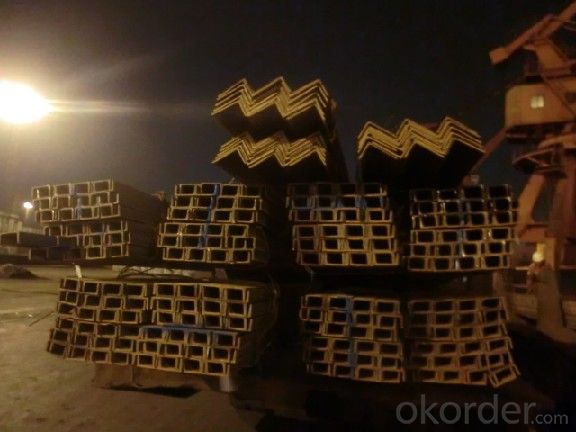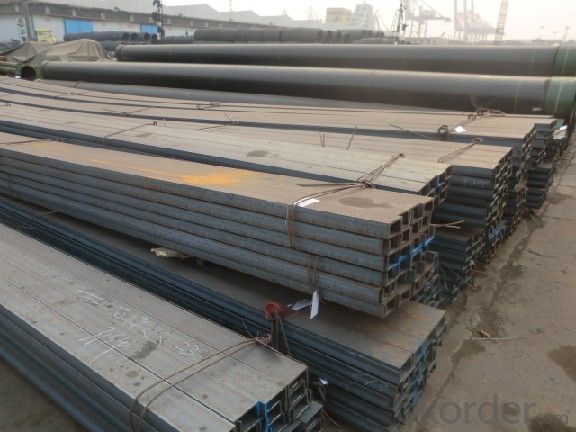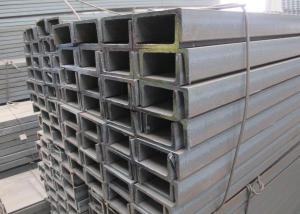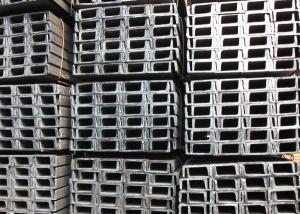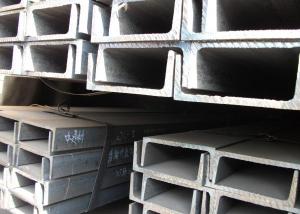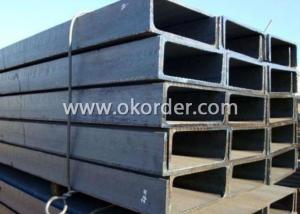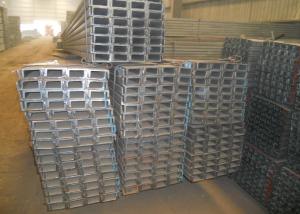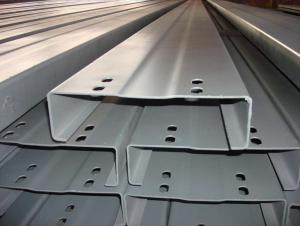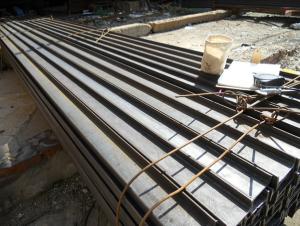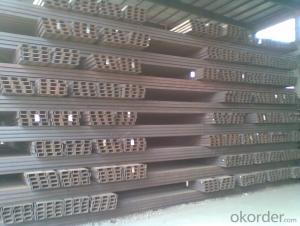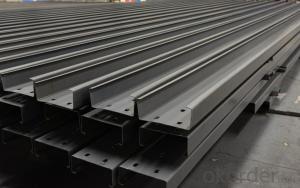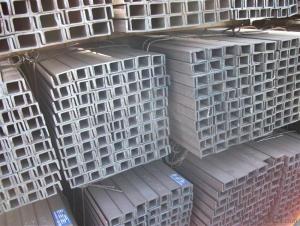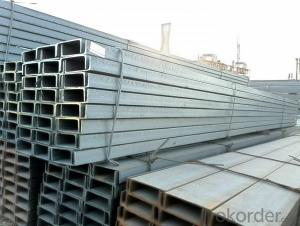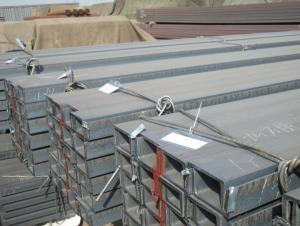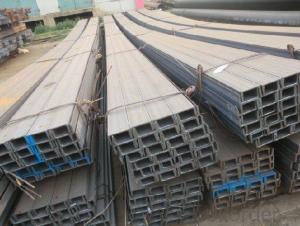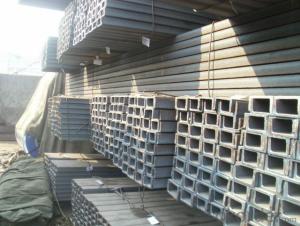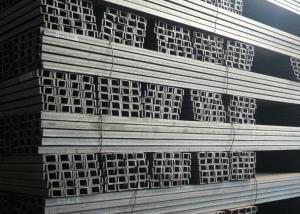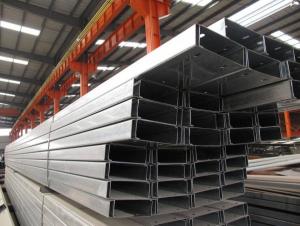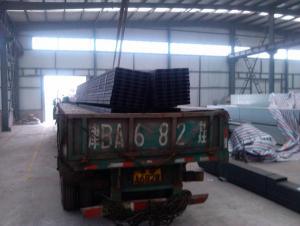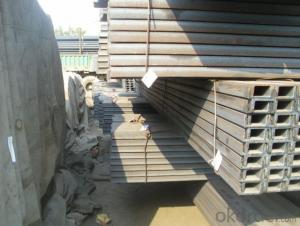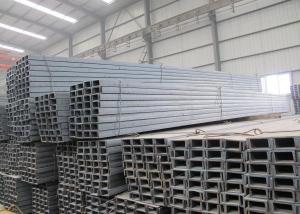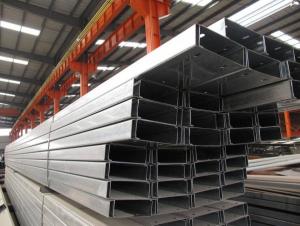Hot Rolled Steel High Qulity U-Chanle Made In China
- Loading Port:
- Tianjin
- Payment Terms:
- TT OR LC
- Min Order Qty:
- 50 m.t.
- Supply Capability:
- 3000 m.t./month
OKorder Service Pledge
OKorder Financial Service
You Might Also Like
Specification
Product Description:
OKorder is offering Hot Rolled Steel High Qulity U-Chanle Made In China at great prices with worldwide shipping. Our supplier is a world-class manufacturer of steel, with our products utilized the world over. OKorder annually supplies products to European, North American and Asian markets. We provide quotations within 24 hours of receiving an inquiry and guarantee competitive prices.
Product Applications:
Hot Rolled Steel High Qulity U-Chanle Made In China are ideal for structural applications and are widely used in the construction of buildings and bridges, and the manufacturing, petrochemical, and transportation industries.
Product Advantages:
OKorder's Hot Rolled Steel High Qulity U-Chanle Made In China are durable, strong, and resist corrosion.
Main Product Features:
· Premium quality
· Prompt delivery & seaworthy packing (30 days after receiving deposit)
· Corrosion resistance
· Can be recycled and reused
· Mill test certification
· Professional Service
· Competitive pricing
Product Specifications:
GB U CHANNEL | Standard | Sectional | Dimension |
| Mass: |
| (mm) | (mm) | (mm) | (mm) |
|
50X37 | 50 | 37 | 4.50 | 7.0 | 5.438 |
63X40 | 63 | 40 | 4.80 | 7.5 | 6.634 |
80x43 | 80 | 43 | 5.00 | 8.0 | 8.045 |
|
|
|
|
|
|
100x48 | 100 | 48 | 5.30 | 8.5 | 10.007 |
120x53 | 120 | 53 | 5.50 | 9.0 | 12.059 |
140x58 | 140 | 58 | 6.00 | 9.5 | 14.535 |
140x60 | 140 | 60 | 8.00 | 9.5 | 16.733 |
|
|
|
|
|
|
160x63 | 160 | 63 | 6.50 | 10.0 | 17.240 |
160x65 | 160 | 65 | 8.50 | 10.0 | 19.752 |
|
|
|
|
|
|
180x68 | 180 | 68 | 7.00 | 10.5 | 20.174 |
180x70 | 180 | 70 | 9.00 | 10.5 | 23.000 |
|
|
|
|
|
|
200x73 | 200 | 73 | 7.00 | 11.0 | 22.637 |
200x75 | 200 | 75 | 9.00 | 11.0 | 25.777 |
|
|
|
|
|
|
220x77 | 220 | 77 | 7.00 | 11.5 | 24.999 |
220x79 | 220 | 79 | 9.00 | 11.5 | 28.453 |
|
|
|
|
|
|
250x78 | 250 | 78 | 7.00 | 12.0 | 27.410 |
250x80 | 250 | 80 | 9.00 | 12.0 | 31.335 |
250x82 | 250 | 82 | 11.00 | 12.0 | 35.260 |
|
|
|
|
| |
280x82 | 280 | 82 | 7.50 | 12.5 | 31.427 |
280x84 | 280 | 84 | 9.50 | 12.5 | 35.823 |
280x86 | 280 | 86 | 11.50 | 12.5 | 40.219 |
|
|
|
|
|
|
300x85 | 300 | 85 | 7.50 | 13.5 | 34.463 |
300x87 | 300 | 87 | 9.50 | 13.5 | 39.173 |
300x89 | 300 | 89 | 11.50 | 13.5 | 43.883 |
Package & Delivery of Channel Steel:
The steel u channel will be packed in bundle with steel wire at each end of every bundle and color marking in order to help the customer to recognize his goods more easily at sight.
And steel u channel could be loaded into 20ft or 40ft container, or by bulk cargo. If the weight of each bundle reaches less than 3.5 mt, the loading by break bulk cargo should be choosed. When the weight of each bundle reaches less than 3mt, the loading by container should be choosed.
As for the transportaion from mill to loading port, the truck will be usually used. And the maximum quantity for each truck is 40mt.
FAQ:
Q1: Why buy Materials & Equipment from OKorder.com?
A1: All products offered byOKorder.com are carefully selected from China's most reliable manufacturing enterprises. Through its ISO certifications, OKorder.com adheres to the highest standards and a commitment to supply chain safety and customer satisfaction.
Q2: How do we guarantee the quality of our products?
A2: We have established an advanced quality management system which conducts strict quality tests at every step, from raw materials to the final product. At the same time, we provide extensive follow-up service assurances as required.
Q3: How soon can we receive the product after purchase?
A3: Within three days of placing an order, we will begin production. The specific shipping date is dependent upon international and government factors, but is typically 7 to 10 workdays.
Q4: What makes stainless steel stainless?
A4: Stainless steel must contain at least 10.5 % chromium. It is this element that reacts with the oxygen in the air to form a complex chrome-oxide surface layer that is invisible but strong enough to prevent further oxygen from "staining" (rusting) the surface. Higher levels of chromium and the addition of other alloying elements such as nickel and molybdenum enhance this surface layer and improve the corrosion resistance of the stainless material.
Q5: Can stainless steel rust?
A5: Stainless does not "rust" as you think of regular steel rusting with a red oxide on the surface that flakes off. If you see red rust it is probably due to some iron particles that have contaminated the surface of the stainless steel and it is these iron particles that are rusting. Look at the source of the rusting and see if you can remove it from the surface.
Images:
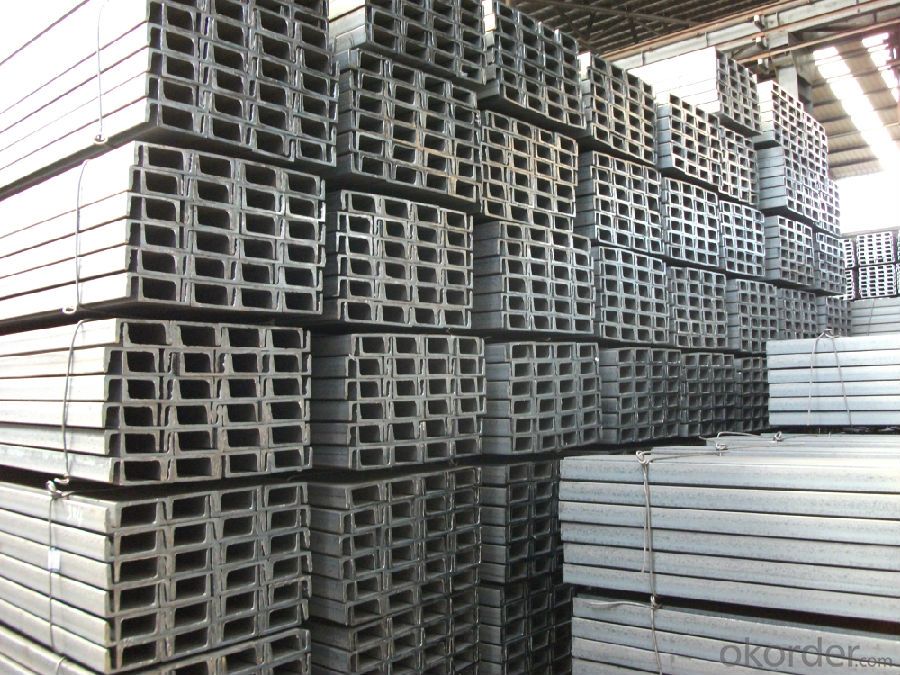
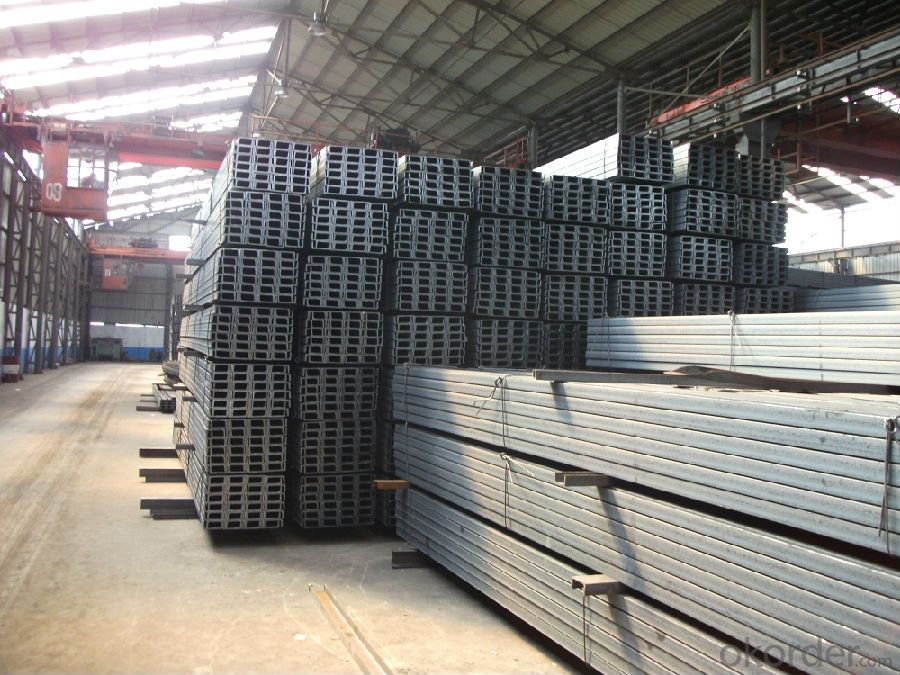
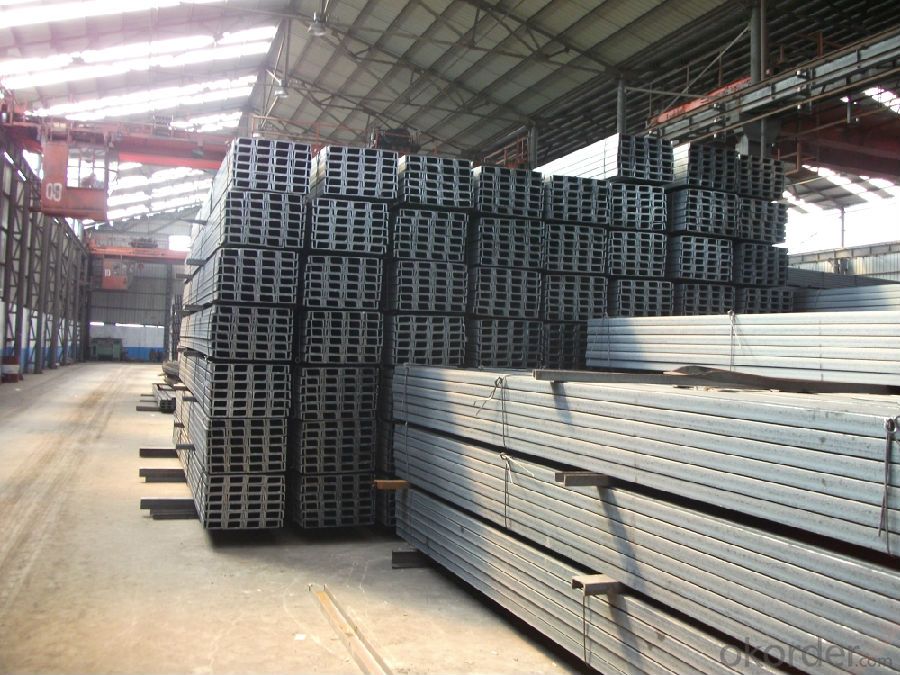
- Q: How do steel channels compare to other types of steel profiles?
- When comparing steel channels to other steel profiles, it becomes evident that they possess numerous benefits. Firstly, their high strength and durability are widely recognized. Due to their U-shaped design, steel channels can effectively bear heavy loads without succumbing to bending or warping, making them ideal for structural purposes. Additionally, this strength enables them to withstand extreme weather conditions and external forces, ensuring their longevity. Secondly, steel channels offer exceptional versatility. They can be easily customized and fabricated to meet specific project requirements, making them suitable for a variety of applications, including structural support, framing, and reinforcement. Furthermore, steel channels are available in various sizes and thicknesses, allowing them to be utilized in projects of different scales. Moreover, steel channels exhibit remarkable corrosion resistance. Typically crafted from carbon or stainless steel, which both possess natural anti-corrosion properties, they are well-suited for outdoor and marine environments that are prone to moisture or chemical exposure. Furthermore, steel channels are cost-effective. Being widely available and abundant, steel is relatively affordable compared to other construction materials. Additionally, the durability and longevity of steel channels result in reduced maintenance costs over time, making them a cost-efficient choice for many applications. Lastly, steel channels offer ease of installation. Their uniform shape and standardized dimensions make them simple to work with, thereby reducing installation time and labor costs. This ease of installation also makes steel channels the preferred choice for DIY projects or small-scale constructions. In conclusion, steel channels possess numerous advantages over other steel profiles. Their strength, versatility, corrosion resistance, cost-effectiveness, and ease of installation make them a popular choice for various construction projects.
- Q: Channel
- Channel steel is a long strip steel with a cross section, and belongs to the construction and mechanical carbon structural steel. It is a complex section steel, whose cross section has a groove shape. Channel steel is mainly used in building structure, curtain wall engineering, mechanical equipment and vehicle manufacturing, etc..
- Q: Can steel channels be used for bracing purposes?
- Steel channels have a wide range of uses in construction and engineering, including bracing. They are commonly employed to provide structural support and reinforcement. Their strength and durability make them capable of withstanding heavy loads and ensuring stability. Steel channels can be customized and easily installed to meet specific bracing needs. They effectively reinforce various components, preventing buckling, bending, or collapse. In conclusion, steel channels are a dependable and efficient choice for bracing in construction and engineering projects.
- Q: Are steel channels suitable for sports facility construction?
- Indeed, sports facility construction can indeed utilize steel channels. Due to their robustness and endurance, steel channels are frequently employed in the construction field. They offer structural reinforcement and possess the capacity to endure substantial loads, rendering them an optimal choice for sports facilities that necessitate extensive open spaces and the ability to accommodate a sizable crowd. Steel channels can be employed in the development of grandstands, bleachers, and other seating areas, as well as in the framing of structures such as roofs and walls. Furthermore, steel channels exhibit resistance to corrosion, thereby establishing them as a dependable option for sports facilities that may be exposed to outdoor elements. Their adaptability and ease of customization and fabrication to comply with precise design requirements contribute to the widespread utilization of steel channels in sports facility construction.
- Q: Are steel channels suitable for architectural feature elements?
- Architectural feature elements can indeed be made suitable with the use of steel channels. These channels possess a high level of versatility and can be utilized in a wide range of architectural applications. Their notable attributes include strength, durability, and the ability to bear heavy loads, which contribute to their popularity in structural elements found within buildings. Steel channels can be employed effectively in architectural design to create distinctive and visually captivating features. They can be seamlessly integrated into building facades, staircases, handrails, and other decorative components. The customizable nature of steel channels allows architects to craft intricate and elaborate designs, catering to their specific requirements. Moreover, steel channels offer a variety of finishes that can enhance their aesthetic appeal. They can be painted, powder-coated, or left exposed to embrace an industrial appearance. The multitude of finishing options grants architects the ability to achieve their desired visual effect for their architectural feature elements. Another advantage of utilizing steel channels is their resilience against harsh weather conditions and resistance to corrosion. This quality makes them suitable for both indoor and outdoor architectural applications. With minimal maintenance requirements, steel channels prove advantageous for architectural features that may be challenging to access for regular upkeep. In conclusion, steel channels present a combination of strength, durability, and design flexibility, rendering them an ideal choice for architectural feature elements. Their ability to support heavy loads, versatility in design, and resistance to weather make them a reliable and enduring option for creating visually captivating architectural features.
- Q: What is the difference between hot-rolled and cold-formed steel channels?
- The main difference between hot-rolled and cold-formed steel channels lies in the manufacturing process. Hot-rolled steel channels are formed by heating the steel billet to high temperatures and then rolling it into the desired shape. This method results in a more uniform grain structure and higher strength compared to cold-formed steel channels. On the other hand, cold-formed steel channels are created by bending or rolling steel sheets at room temperature. This process is more cost-effective and allows for greater design flexibility, but the resulting channels may have a less consistent grain structure and slightly lower strength.
- Q: Can steel channels be used for railway tracks?
- No, steel channels cannot be used for railway tracks. Railway tracks require a specific type of steel called "rail steel" or "railroad steel" that is specifically designed and manufactured for the purpose of constructing railway tracks. Rail steel has certain properties that make it suitable for withstanding the heavy loads, constant stress, and wear and tear that railway tracks face. It has a specific chemical composition and is made through a specialized manufacturing process to ensure its durability and strength. Steel channels, on the other hand, are not designed to withstand the same level of stress and wear as rail steel and would quickly deteriorate under the heavy loads and constant movement of trains. Therefore, it is essential to use rail steel for constructing railway tracks to ensure the safety and efficiency of the rail system.
- Q: How are steel channels protected against rusting and corrosion?
- Steel channels are protected against rusting and corrosion through various methods such as coating them with corrosion-resistant materials like zinc or paint, galvanizing them by applying a layer of zinc through a hot-dip process, or using stainless steel channels which have inherent resistance to rusting and corrosion.
- Q: Which bearing capacity is stronger?
- I-beam has stronger bearing capacity than channel steel
- Q: Can steel channels be used for support beams?
- Indeed, support beams can be made using steel channels. In construction, steel channels are frequently employed due to their exceptional strength and durability. They are well-suited for offering structural support and can serve as beams for bearing hefty loads. Steel channels possess versatility and can be utilized in diverse scenarios, such as bridges, buildings, and infrastructure undertakings. With their capacity to endure substantial weights and provide stability, steel channels emerge as an appropriate selection for support beams.
Send your message to us
Hot Rolled Steel High Qulity U-Chanle Made In China
- Loading Port:
- Tianjin
- Payment Terms:
- TT OR LC
- Min Order Qty:
- 50 m.t.
- Supply Capability:
- 3000 m.t./month
OKorder Service Pledge
OKorder Financial Service
Similar products
Hot products
Hot Searches
Related keywords
